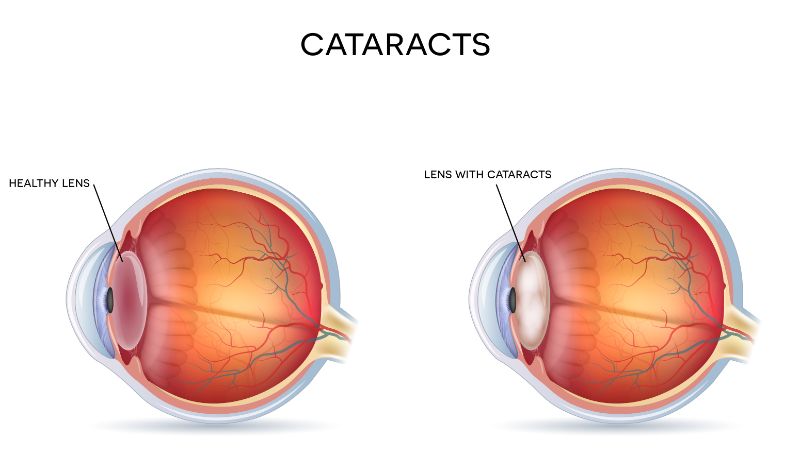
Cataract surgery involves the removal and replacement of the natural lens of the eye that has become cloudy because of cataracts. A healthy eye's natural lens is clear and helps focus light on the retina. When a cataract develops, the lens becomes cloudy, leading to blurry or distorted vision.
Regular eye exams are the best way to identify cataracts in the earliest stages. The surgical procedure to treat cataracts is done under local anesthesia that numbs the eye and surrounding area. You can usually go home the same day after the surgery.
Cataract surgery can significantly improve your vision and quality of life, allowing you to enjoy your daily activities with a clear vision. At EyesNY, we offer different treatment options to slow or stop the progression of cataracts and improve your health.
Most cataracts develop slowly and progress over time. A cloudy vision can affect your lifestyle by making reading, driving, and regular activities difficult.
Some people opt to initially deal with cataracts by wearing eyeglasses or using stronger lighting. Cataract surgery may be the best option for you if your vision impairment has developed into a further stage.
During your consultation, our eye specialists will perform an ultrasound test to determine the right type of lens implant for your case. The lenses available range from the following options:
Your doctor might instruct you not to eat or drink at least 12 hours before your surgery. Also, arranging a ride back home with a friend or family member is prudent since you won’t be able to drive right after surgery.
First, your doctor will apply local anesthesia around your eyes and use eye drops to dilate your pupil. To replace your clouded lens with a clear artificial one, your doctor may perform one of the following procedures:
Cataract surgery can take up to 30 minutes to perform. Once the new lens has been placed, your vision may become blurry as your eye heals.
You will need to rest for a couple of days after surgery and wear a protective eyepatch. Your doctor may prescribe eye drops and medication to prevent infection and reduce swelling.
You will be able to return to your regular activities and stop feeling discomfort a few days after the procedure. However, full healing may take up to eight weeks.
Your doctor may prescribe temporary glasses for one to three months after surgery.
Cataract surgery is done under local anesthesia that numbs the eye and surrounding area. You may feel some pressure but should not experience any pain.
After surgery, discomfort or mild pain is expected but can be managed with over-the-counter pain medications, such as ibuprofen. We recommend following your doctor’s indications for after-surgery care to ensure a successful recovery.
As with any other surgical procedure, cataract surgery involves some risks. With proper aftercare, most patients recover successfully and can return to their normal activities within a few days.
Although rare, complications could show up. If you notice any of the following, contact your doctor:
EyesNY offers treatment to help patients slow or stop the progression of cataracts. Our specialized team of ophthalmologists is ready to assess your needs and give you the high-quality vision care you deserve.
We work with cutting-edge technology to identify the root cause of your condition and create personalized treatment plans. Our caring staff is ready to welcome you and meet your ocular health and vision needs. We offer comprehensive eye care services, including cataract surgery.
If you’d like a consultation or more information, contact us, schedule an appointment online, or visit our clinics. You can also visit any of our clinic locations around New York, including Malta, Clifton Park, Troy, Saratoga Springs, and Queensbury.
Malta
658 Malta Ave., Ste 101
Malta, NY 12020
Phone: (518) 580-0553
Saratoga Springs
414 Maple Ave Ste 200
Saratoga Springs, NY 12866
Phone: (518) 580-0553
Clifton Park
1712 U.S. 9
Clifton Park, NY 12065
Phone: (518) 580-0553
Queensbury
535 Bay Road
Queensbury, NY 12804
Phone: (518) 580-0553
Troy
2200 Burdett Street Ste 206
Troy, NY 12180
Phone: (518) 580-0553
